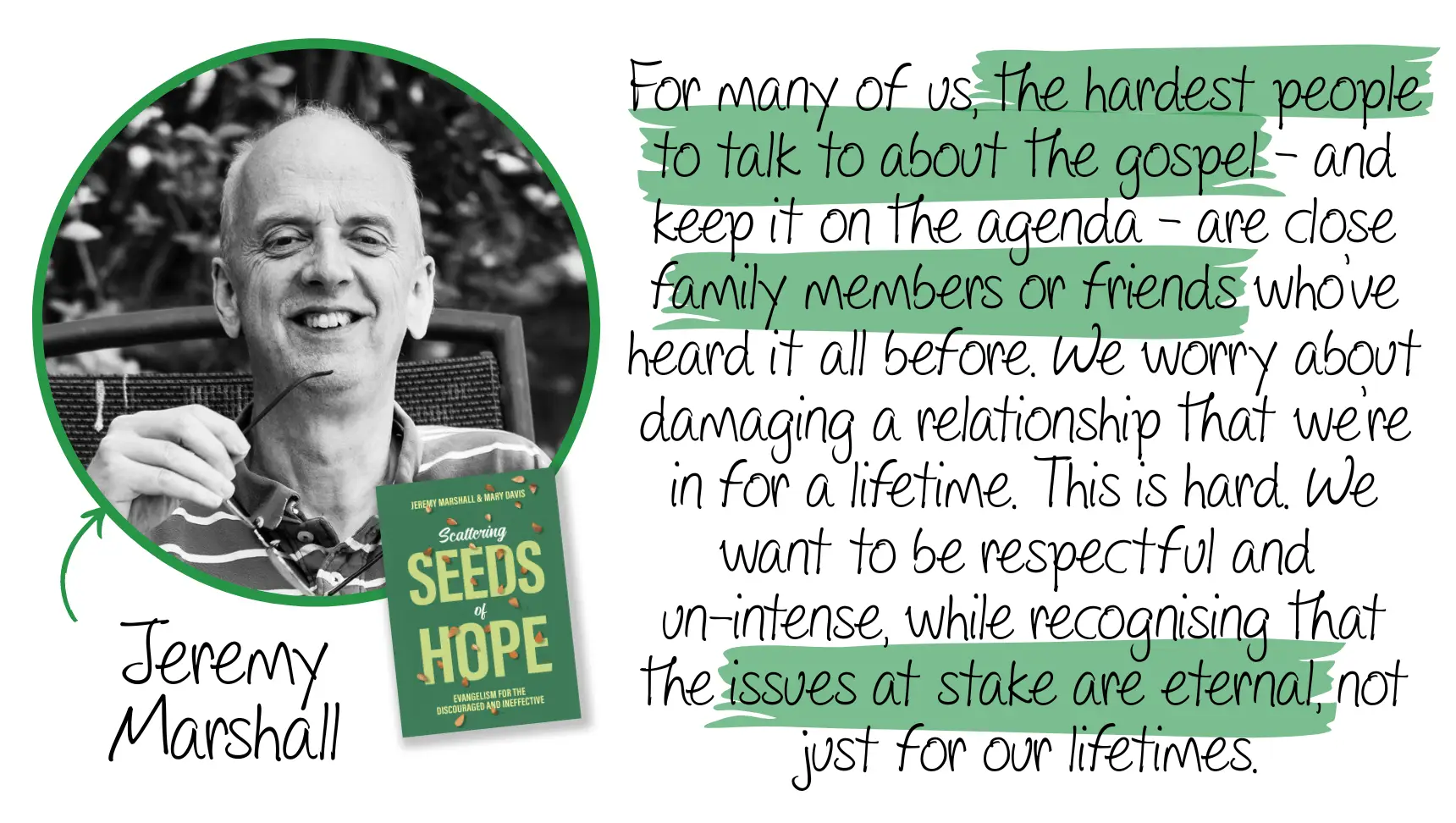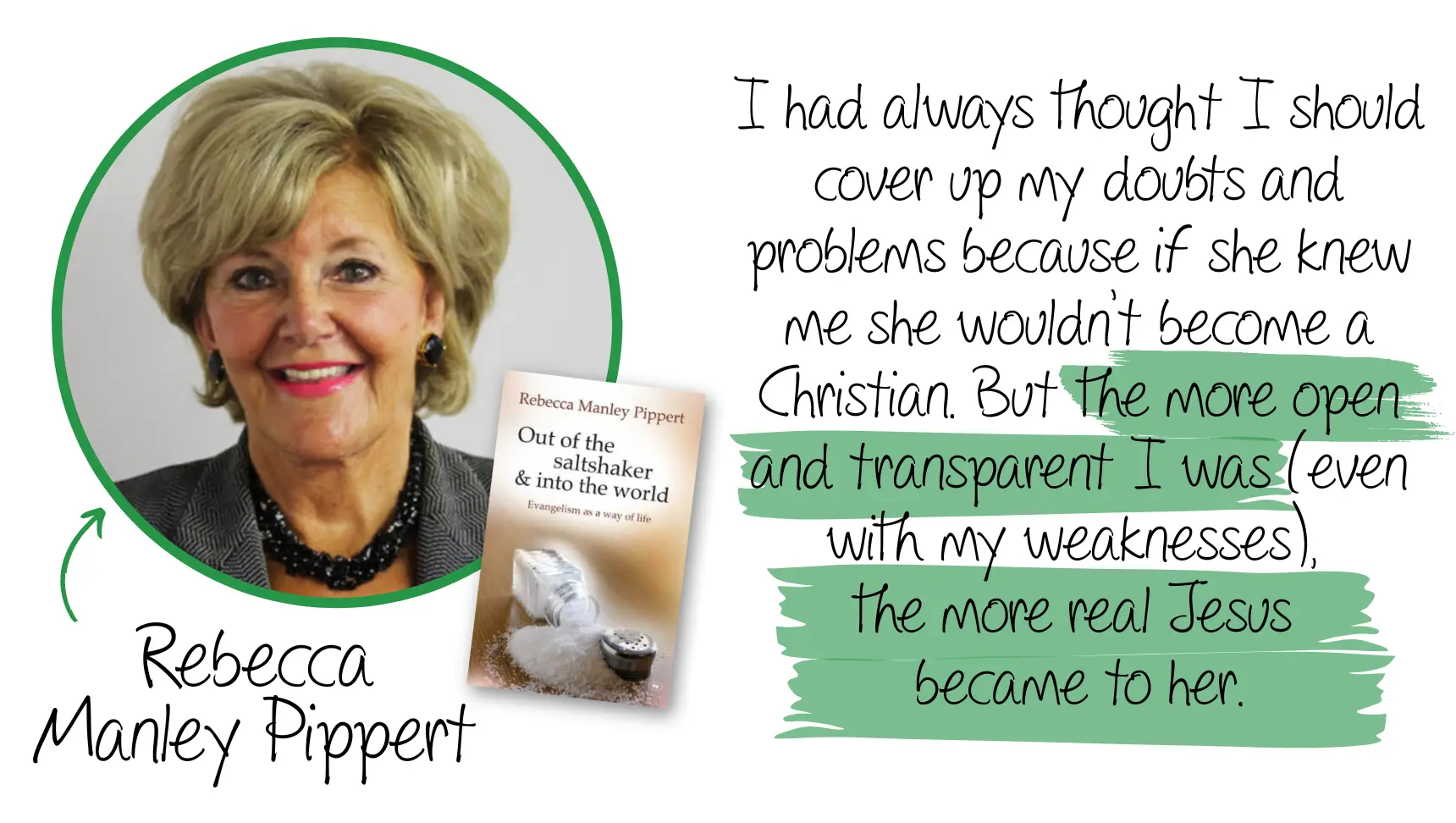
How can we share the gospel with our family?
9 minute read
Sharing the gospel can be hard. With family members, it can be even harder.
It’s likely that everyone has at least one family member who doesn’t have a relationship with God. For some people it may even be everyone in their family.
We may have scars from past attempts to share the gospel with our family. Perhaps our enthusiasm meant that our gentleness and respect (1 Peter 3:15 ) wasn’t quite where it could have been.
Maybe a family dispute makes you feel you’ve blown your chance of being a good witness. Or maybe your family are so anti-Christian that they make fun and ridicule you whenever you bring up spiritual things, or may have even alienated you.
We hope that we can encourage and support you as you pray, point to Jesus, and persevere in this area of evangelism.
Why Sharing the Gospel with Family is Hard
Our family are the people who know us the best—our good bits and our not so good bits. They know the baggage we bring with us, and almost certainly have a back catalogue of stories and anecdotes which we’d much prefer to forget. They’ve seen us lose our cool, behave in ways we regret, and make mistakes. This can make us think they would never take us seriously.
To some family members a change in our lifestyle once we are saved means they feel judged. Perhaps activities you used to do together are now off limits.
And what happens when we have shared the gospel faithfully and they don’t respond positively? Is that it?
Sharing the gospel with our family requires more grace, love and patience than any other relationship, but the gospel itself remains the same.
When we’re tempted to become overwhelmed or disheartened, it is helpful to remember that many who have gone before us have been through the same things.
Jesus’ family weren’t sure how to respond to his ministry (Mark 3:21), and Jesus even said “A prophet is not without honor except in his own town and in his own home.” Matthew 13:57
Here are three things to remember when sharing the gospel with our family:

1. Pray
The first thing we should be doing is praying for our family members. Primarily, we should pray for their salvation, but we should also pray for our relationship with them; for opportunities to share the gospel; for other Christians to enter their sphere of influence.
Prayer is so important because it acknowledges our reliance on God. When we admit that it is not through our clever or persuasive words (1 Corinthians 1:17), or through our moral lifestyles that people will be saved, and instead place ourselves at the foot of the cross, we will find hope.
Practical Advice
A prayer diary or a schedule where you pray for specific family members means we are prompted to prayer, lest we forget. Apps like PrayerMate allow this very easily and enable you to add specific prayer points for each family member.
Be thankful for your family - this may be easier said than done, certainly for some family members! - and pray that you would see them through the eyes of Jesus.
Confess any resentment, self-righteousness, lack of love, or unforgiveness towards your family.
Clare’s Story
Clare Luther became a Christian in her twenties and struggled in the early years of her marriage as her husband Tim wasn’t a believer.
“Jesus’s wonderful life-giving light was bringing me such joy, but it was also exposing a difficult darkness within our marriage. Tim and I were not a team. We didn’t share the same values or morals and painfully it started to matter that he didn’t know Jesus; the team was a team of three - our two daughters and I. To the outside world we appeared happy and just like ‘everyone else’, but my heart wept with a deep loneliness, a sense of marital disappointment.
1 Peter 3:1-2 was instrumental in stopping me from walking out as God showed me, in his word, that I was known.
Wives, in the same way submit yourselves to your own husbands so that, if any of them do not believe the word, they may be won over without words by the behaviour of their wives, when they see the purity and reverence of your lives. 1 Peter 3 :1
In 2021, after 10 years of praying – praying alone, praying with our children (now 20 and 18 years old) and praying with anyone and everyone who would ask what I’d like prayer for – Tim came to faith. He stood in front of our church family, and his own immediate family of non-believers, to openly profess Christ as his Master, Lord and Saviour. In this new season, our marriage is richer than it’s ever been and slowly we are loving each other anew, with God at the centre.”

2. Point to Jesus
“For many of us, the hardest people to talk to about the gospel – and keep it on the agenda – are close family members or friends who’ve heard it all before. We worry about damaging a relationship that we’re in for a lifetime. This is hard. We want to be respectful and un-intense, while recognising that the issues at stake are eternal, not just for our lifetimes.” Jeremy Marshall, Scattering Seeds of Hope.

One of the big stumbling blocks we have with our family is that we incorrectly feel that we are responsible for them becoming a Christian. Friend, that is simply not true.
Of course we have a responsibility to share the gospel with them, but how and when they respond is something we leave with God. We simply point them to Jesus.
When we realise that it is not through our clever or persuasive words or through our lifestyles that people will be saved, we will find hope and liberty.
Another stumbling block is that we feel we are actually a hindrance to the gospel because our family sees us at our worst. When we mess up we can be honest with our family, not trying to hide it, and explain God’s grace and forgiveness.
Rebecca Manley Pippert in Out of the Saltshaker recalls the conversion of an atheist friend who specifically noticed her ability to admit her wrongdoing as a factor in taking the Christian faith seriously.
“ ‘All my life I used to think, How arrogant for someone to call himself a Christian, to think he’s that good. But then I got to know you - and Becky, you are far from perfect, yet you call yourself a Christian. So my first shock was to discover you “blow it” like I do. But the biggest shock was that you admitted it, where I couldn’t. Suddenly I saw that being a Christian didn’t mean never failing, but admitting when you’ve failed.’
I had always thought I should cover up my doubts and problems because if she knew me she wouldn’t become a Christian. But the more open and transparent I was (even with my weaknesses), the more real Jesus became to her.”

How would you respond if a non-Christian family member threw the “Call yourself a Christian…” grenade at you if your behaviour didn’t match their expectations?
Excuses? Retaliation? Or would you use it as an opportunity to share something of the gospel? Or ask them what their expectations of a Christian were, knowing that there is no one righteous except Jesus (Romans 3:10)?
We can ask for their forgiveness when we hurt them. In a world where people run from the consequences of their behaviour and excuse their wrong doing, Christians have a better story to tell. One where acknowledging our need of forgiveness and seeking reconciliation is central. This also means extending forgiveness to those in our family who hurt us, explaining that it is the power of the Holy Spirit which equips us to do that, and for the sake of the Gospel. We don’t think, “Wow, I’m such a great person!”; we say, “Wow, without the Spirit's help I could never be like this.”
When people ask us questions, it can be tempting to try and provide a concise answer and shut off every possible objection before they’re raised.
It’s helpful when asked questions to consider the RH factor. Is what they’re asking a Red Herring, or a Real Hindrance?
Of the 183 questions we see Jesus being asked in the gospels, He is only recorded as answering 3! Jesus primarily responds with a question. Asking questions back engages others in the process rather than just presenting a conclusion. It can also help us establish the background (and sometimes baggage) that a question may bring with it.
Before jumping in with a 12-point answer to a question, perhaps we could ask a few questions to help get to the core issue in which someone is interested:
“What makes you believe that?”
“What do you mean by that?”
“Where do you think that is taught in the Bible?”
“How does that make you feel?”

Although answering questions directly isn’t wrong, it can stop people from thinking issues through for themselves. Some people are ready to brush off our answers no matter how well they are constructed, and yet when we ask them to consider for themselves their question, it can be very revealing.

3. Persevere
Wouldn’t it be amazing if the first time we shared the gospel with our family they immediately came to Christ? This does sometimes happen, but the Bible doesn’t promise this, and it isn’t the experience of most people.
The process of witnessing and sharing the gospel with our family may be a marathon, not a sprint.
Roger Carswell, Evangelistic Living
“Many of the people to whom we witness will put on a mask of indifference, but we never know what is churning in their minds. Whilst we seek to live a consistent Christian life - quietly but faithfully praying, and taking the opportunities to speak - there may be a new openness to the gospel in time”

If we have invited our family along to services, evangelistic events, or church activities and they have previously said no, that doesn’t mean we can’t continue to ask, wrapping the invitation in prayer.
When they have previously shut down conversations about faith, we shouldn’t assume that we can never revisit those conversations.
Simon's Story
Simon Camilleri spent three decades trying to share the gospel with his father:
“My father was never interested in gospel conversations. I brought him to church functions and evangelistic events and he always responded with the feeling that they were just trying to make him feel guilty. He often would shut down heavy conversations in favour of lighter topics that avoided disagreements.
But last year he was diagnosed with cancer and over the months he began to grapple with both his mortality and the fact that he would stand before God after death. This led him to ask for my prayers and gave me more precious opportunities to share the gospel with him in one year than I had had in the three decades since becoming a Christian. In the end, I honestly don’t know if he responded to the gospel, but I know I would never have had the opportunity to share it with him if I had given up talking to him about Jesus the first time he rejected it.
The best advice I can give is to simply be consistently open about your faith, your relationship with Christ and the difference he makes in your life. You don’t have to call them to respond to the gospel every time you catch up, but don’t be shy about what’s happening at your church, or what Christian book you’re reading or even just what spiritual things you are thinking about.
So persevere, share what you can, live a life continuously shaped by the gospel and pray. Pray that God opens their hearts and the door to gospel conversations, being confident that at the very least, God can use your life to commend the gospel to them in case someone else has that opportunity.”
The other thing to note is that it’s not too late. You may look back on your attempts -or lack thereof - to reach your family and cringe. But God’s mercies are new every morning.
What is stopping you from reaching out today with a message, an invitation for coffee or dinner, a word of encouragement, or the reassurance that you’re praying for their difficult situation or thanking God for their successes?
We pray that you would be encouraged to view your family through the eyes of our Saviour, and that you would be empowered by the Spirit to persevere in pointing them to Him.
Other helpful articles:
Evangelism - A Word Christians Fear?
Evangelism for the Disheartened and Discouraged
Books which may be helpful:
Scattering Seeds of Hope - Jeremy Marshall
Out of the Saltshaker & Into the World - Rebecca Manley Pippert
Evangelistic Living - Roger Carswell
How to Talk about Jesus without Looking like an Idiot - Andy Bannister